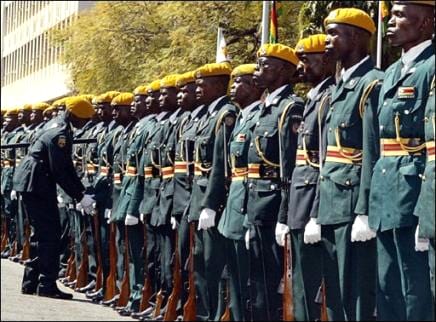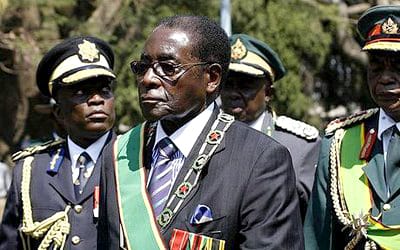by Jean Damu

Many say these reactions, which in numerous cases took the form of establishing military corporations in the Democratic Republic of Congo, likely have contributed greatly to the grand Zimbabwean meltdown; and others claim these reactions in fact constitute a military coup.
Furthermore, beyond the tentative establishment of a unity government, there seems to be little good news coming out of Zimbabwe.
In the last 90 days we have been informed of a partially successful assassination attempt against Air Marshall Perence Shiri (he was wounded), that President Mugabe has purchased a multi-million dollar compound in Hong Kong, that the family of former Deputy Commander of ZANLA (Zimbabwe African National Liberation Army) Solomon Mujuru (aka Rex Nhongo) was thwarted in an attempt to illegally export and sell 3,600 kilograms of gold and diamonds on a monthly basis from Congo and that Zimbabwe college students must now pay for their educations in dollars.
However, the most debilitating factor of life for Zimbabweans is the cause of the hyperinflation: a government that forces the Reserve Bank of Zimbabwe to print money. The government finances its spending by issuing debt that the RBZ must purchase with new Zimbabwe dollars. The bank also produces jobs, at the expense of every Zimbabwean who uses money. Between 2001 and 2007 its staff grew by 120 percent, from 618 to 1,360 employees, the largest increase in any central bank in the world. Still, the bank doesn’t produce accurate, timely data.
The last official inflation statistics, for July, are hopelessly outdated. Money-supply data are even worse; the most recent figures are for January 2008 – ancient history.
In the absence of good official numbers, Steve Henke of the Libertarian Cato Institute developed his own hyperinflation index for Zimbabwe. He derives it from market based price data starting in January 2007.
The index tells us that Zimbabwe’s annual inflation rate recently peaked at 80 billion percent a month. That means around 6.5 quindecillion novemdecillion percent a year – or 65 followed by 107 zeros. To get a handle on it, realize that it’s equivalent to inflation of 98 percent a day. Prices double every 24.7 hours. Shops have simply stopped accepting Zimbabwean dollars.
The catastrophic conditions now experienced by Zimbabwe and which are being intensified by sanctions imposed by the West are dismaying to anyone who has even remotely followed the economic history of Zimbabwe since independence in 1980. For the first 10 years of freedom, local capital and the Zimbabwean state was one of the few historic blocs in Africa that had managed to establish hegemony over foreign capital: capital controlled by the imperialist powers.

Though structural adjustment programs ran just four years, from 1991 through 1995, economic forces were loosened which the state has not been able to check. In fact ZANU has now renounced structural adjustment, while Morgan Tsvangirai’s party, Movement for Democratic Change (MDC), which grew largely out of Zimbabwe’s trade union-led urban protests against the ESAP, now embraces structural adjustment.
Nevertheless, the abandonment of socialist principles and ideology by ZANU, signaled by the adoption of structural adjustment, loosened constraints on personal wealth accumulation by the state’s elites and, as instability and insecurity heightened during the 1990s, the forms of wealth accumulation became mercantilist and non-productive.
Nowhere has this been more true than within Zimbabwe’s military apparatuses. When opportunity presented itself in the form of widespread warfare in the Democratic Republic of the Congo, military leaders and others were quick to take advantage.
Despite having no territorial interests to defend in relationship to the DRC, as did Angola, for example, Zimbabwe’s leaders signed agreements with then DRC President Laurent Kabila to provide Zimbabwean combat troops in exchange for permission to establish Zimbabwean corporations to exploit Congolese raw materials.
A U.N. study of the situation in 2002 informs us:
“The key strategist for the Zimbabwean branch of the elite network is the Speaker of the Parliament and former head of Zimbabwe Intelligence, Emmerson Dambudzo Mnangagwa. Mr. Mnangagwa has won strong support from senior military and intelligence officers for an aggressive policy in the Democratic Republic of the Congo. His key ally is a Commander of ZDF (Zimbabwe Defense Force) and Executive Chairman of COSLEG, General Vitalis Musunga Gava Zvinavashe. [COSLEG is a natural resource exploitation firm largely owned by the family of Joseph Kabila and the Zimbabwe military. Joseph Kabila succeeded his father Laurent as president of the DRC after the elder’s assassination in 2001.] The General and his family have been involved in diamond trading and supply contracts in the Democratic Republic of the Congo. A long-time ally of President Mugabe, Air Marshal Perence Shiri, has been involved in military procurement and organizing air support for the pro-Kinshasa armed groups fighting in the eastern Democratic Republic of the Congo. He is also part of the inner circle of ZDF diamond traders who have turned Harare into a significant illicit diamond-trading center.
“Other prominent Zimbabwean members of the network include Brigadier General Sibusiso Busi Moyo, who is Director General of COSLEG. Brigadier Moyo advised both Tremalt and Oryx Natural Resources, which represented covert Zimbabwean military financial interests in negotiations with State mining companies of the Democratic Republic of the Congo. Air Commodore Mike Tichafa Karakadzai is Deputy Secretary of COSLEG, directing policy and procurement. He played a key role in arranging the Tremalt cobalt and copper deal. Colonel Simpson Sikhulile Nyathi is Director of defence policy for COSLEG. The Minister of Defence and former Security Minister, Sidney Sekeramayi, coordinates with the military leadership and is a shareholder in COSLEG. The UN Panel has a copy of a letter from Mr. Sekeramayi thanking the Chief Executive of Oryx Natural Resources, Thamer Bin Said Ahmed Al-Shanfari, for his material and moral support during the parliamentary elections of 2000. Such contributions violate Zimbabwean law.
“In June 2002, the Panel learned of a secret new ZDF diamond mining operation in Kalobo in Kasai Occidental run by Dube Associates. This company is linked, according to banking documents, through Colonel Tshinga Dube of Zimbabwe Defence Industries to the Ukrainian diamond and arms dealer Leonid Minim, who currently faces smuggling charges in Italy. The diamond mining operations have been conducted in great secrecy.”
John Mikembe, a Zimbabwean member of Transparency International and an early critic of the government, said: “Zimbabwe seems intent on raiding the DRC and making it an economic colony … (but) it won’t be Zimbabwe as a nation that benefits. Instead a number of individuals in the political elite will enrich themselves.”
For its part Zimbabwean military and government spokespersons have long said the military corporate structures erected in the DRC were meant to economically augment their military cooperation with Congo. More recent arguments say the military earnings in the DRC are necessary in light of Western economic sanctions.
The main problem with these arguments is that no one has ever been successful in demonstrating that any significant portion of the money the money earned in the DRC, either through the ZDF mineral extraction corporations or timber extraction corporations ever found its way back to Zimbabwe. Several major loans were denied to Zimbabwe in the early years of involvement with the DRC because the Congo operation was costing Zimbabwe far more than they appeared to be earning.

As popular support for ZANU began to wane by the turn of the century and the personal enrichment of military leaders began to increase, the role of the Joint Operations Command, a body of all the Zimbabwean military and paramilitary leaders and the head of the central bank, ascended.
The Joint Operations Command, recently renamed the National Security Council, was originally established by the Ian Smith regime during he last throes of a dying colonialism in an attempt to beat back the liberation forces. Smith was the last white leader of Rhodesia before it became Zimbabwe.
In light of the destabilization activities of apartheid South Africa against the newly independent Zimbabwe, no doubt the ZANU government felt an urgency to continue this unusual concentration of military, paramilitary and economic power.
In more recent times, however, especially since South Africa is no longer a destabilizing threat and with the vigorous intervention of the Zimbabwean military in economic matters, many fear the National Security Council poses an extreme threat to any efforts to promote or construct democracy.
Catherine Philip, writing in the Times Online last year, quoted “senior diplomats” in Harare as saying “a military coup by stealth” had taken place following the March 2008 elections that rocked the Mugabe camp and the run up to the June electoral run-off and that the Joint Operations Command had taken control of Mugabe’s re-election campaign and was making the day to day decisions of the government.
This is not to suggest that military and political leaders are in lock step with all ZANU decisions. There are known to be factions that disagreed with the militarization of the recent Mugabe campaigns and took pains to distance themselves.
The Mujuru family is one such faction.
However, it is the Mujuru family, reflecting the concerns of the earlier cited John Mikember of Transparency International, headed by Zimbabwe Executive Vice President Grace Mujuru and her husband, former ZANLA Deputy Commander Solomon Mujuru and their daughter and son in law, who are the center of the recent gold and diamond smuggling scandal.
Europeans blew the whistle on the Mujurus when numerous names involved in the gold and diamond transactions turned up on lists of international human rights violators. These lists, largely drawn up by Western political powers, are hypocritical at best when making distinctions between East and West, Muslim and non-Muslim, etc.
But the Swiss firm that balked at completing the Mujuru’s transaction did the world a favor by noting that the illegal riches being smuggled out of the DRC were contributing directly to the warfare in eastern Congo by helping to finance Congolese rebel groups opposed not only to Rwanda, Burundi and Uganda but Kinshasa as well.
This in relation to the Mugabes’ recent purchase of a four-story compound in Hong Kong as well as a diamond cutting company there provide concrete substance to the old question, with friends like these, who do the Zimbabwean people need for enemies?
The truth is Zimbabwe has many friends. The future need not remain bleak, they say. South African and other economists urge that Zimbabwe de-link itself from the Western economic institutions as it did in the 1930s and later following the Smith regime’s withdrawal from the Commonwealth. A degree of economic independence resulted, they say, after each instance.
Writing in the fall 2008 edition of the African Studies Quarterly, Padraing Carmody and Scott Taylor argue that the key to rebuilding Zimbabwe’s economy is to focus on rebuilding the urban-industrial sector, the sector that will most produce jobs. Carmody and Taylor argue there are five reasonable and possible choices of development strategy:
• Unmediated integration into the global market (the IMF/World Bank approach)
• Mediated integration/new regionalism
• Delinking
• Neoliberalism in macroeconomics with grassroots empowerment or
• Market socialism/ecological economics
Clearly the first two choices are problematic and the last three choices would, it seem, depend largely on a strong state infrastructure.
But as rightly noted by Carmody and Taylor, which of these is ultimately adopted in Zimbabwe will depend in no small part on the outcome of the struggle for democracy, social justice and livelihood currently enjoined by Zimbabwe’s people. Looming over all of this, however, remains the role of the military.
Jean Damu is the former western regional representative for N’COBRA, National Coalition of Blacks for Reparations in America and a former member of the International Brotherhood of Sleeping Car Porters, taught Black Studies at the University of New Mexico, has traveled and written extensively in Cuba and Africa and currently serves as a member of the Steering Committee of the Black Alliance for Just Immigration. Email him at jdamu2@yahoo.com.





